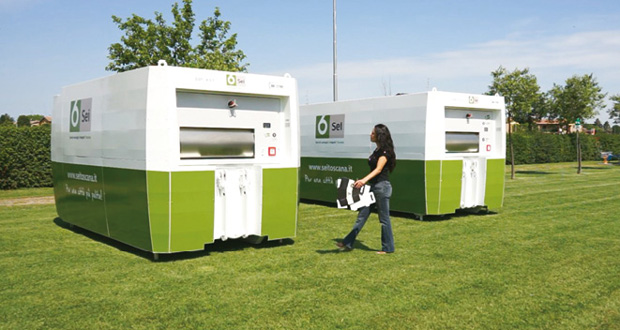 Nuno Lopes from RSK-IWS describes how a waste management infrastructure can be incorporated into new and existing buildings which helps to support sustainable waste management practices
Nuno Lopes from RSK-IWS describes how a waste management infrastructure can be incorporated into new and existing buildings which helps to support sustainable waste management practices
Waste infrastructure plays a critical role in effective and sustainable waste management in both new and existing buildings. It is essential to prioritise waste infrastructure to ensure that waste is collected, processed and disposed of in an environmentally responsible manner. Alongside this, FMs can play a critical role in adding value to the waste management chain by promoting sustainable waste management practices.
NEW BUILDINGS
When it comes to new buildings, waste infrastructure should BE an integral part of the design process. Facilities managers can work closely with architects and construction teams to ensure that waste infrastructure is built into the design from the outset. This includes considering the placement of waste storage areas, recycling facilities and waste processing equipment.
One of the most important aspects of waste infrastructure in new buildings is the inclusion of separate waste streams for different types of waste. This could include separate bins for general waste, recyclable materials and organic waste, such as food scraps. Having separate waste streams makes it much easier to process and dispose of waste in an environmentally responsible way.
Another critical consideration in new buildings is the inclusion of waste processing equipment, such as composters, compactors or balers, which can help to reduce the need for transportation. This not only reduces the environmental impact of waste disposal, including carbon emissions associated with transportation, but also can lead to cost savings on waste management in the long term.
EXISTING BUILDINGS
In existing buildings, waste infrastructure can be more challenging to implement. However, it is still essential to prioritise waste management and look for opportunities to improve waste infrastructure where possible. FMs should conduct regular audits to assess the types and quantities of waste produced in the building. This can help to identify areas in which waste infrastructure could be improved, such as by including additional recycling bins or implementing a composting programme.
Another important consideration in existing buildings is the proper maintenance of waste infrastructure. This includes regular cleaning and upkeep of waste storage areas and equipment, as well as ensuring that waste is collected and processed on a regular schedule. Proper maintenance of waste infrastructure is critical to ensuring that waste is correctly processed and disposed of.
SUSTAINABLE WASTE MANAGEMENT
Effective waste management is not just about collecting and disposing of waste. It is also about promoting sustainable waste management practices that minimise the environmental impact of waste disposal. There are several methods that can be used to support sustainable waste management.
- Reduce waste at the source: one of the most effective ways to promote sustainable waste management is to reduce the amount of waste produced in the first place. Facilities managers can work with tenants and building occupants to promote waste reduction strategies, such as using reusable containers, reducing paper usage and avoiding single-use plastics.
- Implement recycling programmes: recycling is a critical component of sustainable waste management. Facilities should ensure that recycling facilities are readily available and easily accessible to tenants and building occupants. This includes providing separate recycling bins for different types of materials and ensuring that these bins are regularly emptied and processed.
- Implement composting programmes: composting is an effective way to process organic waste, such as food scraps and garden waste. Facility managers can implement composting programmes on-site or work with local composting facilities to process organic waste.
- Invest in waste processing equipment: composters, compactors, balers and shredders can help to process waste on-site, reducing the amount of waste that needs to be transported. Investing in this equipment can save money on waste management costs over the long term and reduce the environmental impact of waste disposal.
- Incorporate information systems to monitor and track waste management practices within a facility: with the help of information systems, facilities managers can track waste generation and disposal patterns, identify areas for improvement and monitor the effectiveness of waste management programmes. They can also use these data to make informed decisions about waste infrastructure and equipment investments.
Waste infrastructure is a critical element in achieving effective and sustainable waste management in all types of buildings, whether they are new or existing ones.
The role of facilities managers in this process is vital, as they can add value to the waste management chain by reducing waste at the source, implementing recycling and composting programmes, investing in waste processing equipment and ensuring proper maintenance of waste infrastructure.
By doing so, they not only contribute to reducing the environmental impact of waste disposal but also save costs on waste management and enhance the overall sustainability and reputation of their buildings. By prioritising waste infrastructure and promoting sustainable waste management practices, we can make a significant difference in minimising the environmental impact of waste disposal and creating a cleaner, healthier planet for generations to come.





